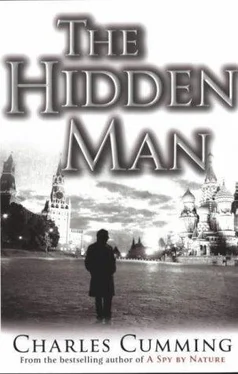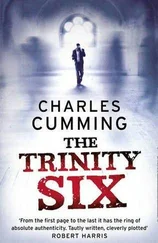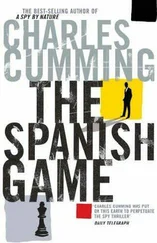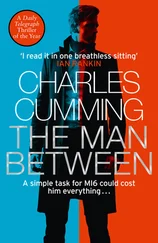Charles Cumming - The hidden man
Здесь есть возможность читать онлайн «Charles Cumming - The hidden man» — ознакомительный отрывок электронной книги совершенно бесплатно, а после прочтения отрывка купить полную версию. В некоторых случаях можно слушать аудио, скачать через торрент в формате fb2 и присутствует краткое содержание. Жанр: Шпионский детектив, на английском языке. Описание произведения, (предисловие) а так же отзывы посетителей доступны на портале библиотеки ЛибКат.
- Название:The hidden man
- Автор:
- Жанр:
- Год:неизвестен
- ISBN:нет данных
- Рейтинг книги:3 / 5. Голосов: 1
-
Избранное:Добавить в избранное
- Отзывы:
-
Ваша оценка:
- 60
- 1
- 2
- 3
- 4
- 5
The hidden man: краткое содержание, описание и аннотация
Предлагаем к чтению аннотацию, описание, краткое содержание или предисловие (зависит от того, что написал сам автор книги «The hidden man»). Если вы не нашли необходимую информацию о книге — напишите в комментариях, мы постараемся отыскать её.
The hidden man — читать онлайн ознакомительный отрывок
Ниже представлен текст книги, разбитый по страницам. Система сохранения места последней прочитанной страницы, позволяет с удобством читать онлайн бесплатно книгу «The hidden man», без необходимости каждый раз заново искать на чём Вы остановились. Поставьте закладку, и сможете в любой момент перейти на страницу, на которой закончили чтение.
Интервал:
Закладка:
‘But I work for Seb,’ he said. ‘I can’t just quit and run this place. I’m not even looking for another job.’
Mark wondered if that had been the wrong thing to say. If Randall needed him to get close to Tamarov, this was the perfect opportunity. To refuse might jeopardize the relationship.
‘Of course we will offer you equity,’ Tamarov was saying, wrongly assuming that Mark was stalling over money. ‘We can discuss arrangements so that you own a portion of the business…’
‘No, it’s not that. It’s not that, Vlad.’ He didn’t know which way to go. It occurred to him that Philippe had been ensnared in a similar fashion, headhunted out of Libra. ‘I just don’t understand the sudden offer. Is there something I should know about? Everything seems a bit chaotic.’
Tamarov looked offended.
‘Chaotic? I can assure you that all restaurants look like this a few days before they are opening. You know this, Mark, it is normal. Does your club in Moscow seem like it is ready for opening? No. So let me show you our bathrooms. They are completely finished. There is nothing chaotic about this.
Nothing.’
Both bathrooms were indeed completely finished, a mock-Arab nightmare of black tiles and freestanding crimson lamps. Mark continued to waver and Tamarov felt it necessary to force his point.
‘My problem is this,’ he said, and actually pressed his index finger against the lapel of Mark’s jacket, as if retaliating to an insult that had never been landed. ‘People in your country are concerned. They think that we are all gangsters in the East, they think that it is a mistake to trust us, to let us invest in your country. Perhaps you think this, Mark, even though you have been in Moscow, you have been in Petersburg, and you have seen these things at first hand. But let me tell you something, as your friend but also as somebody who knows about how work must be conducted. If you were a Russian, you too would be a gangster.’ He let the observation settle on Mark, digging out the pause. ‘You would have no choice. What does this word “mafia” mean, anyway? Does it mean violence? Does it mean that we are criminals? Of course not, and who is to judge? You think that a mafia did not exist before Mr Gorbachev, before Yeltsin? You think that the Soviet system was not in itself an organized crime? This is naive. At least now the wealth is in the control of the people.’
‘Spoken like a true communist,’ Mark said, but Tamarov ignored him.
‘The difference today is that the people must now fight for this wealth. A clever Russian, a Latvian, a Georgian, understands that today’s world is about sink or swim. If I am to survive, if I am to put food on the table for my wife, for my children, it is necessary to fight. Not with guns, not with violence, but with the mind.’ Tamarov tapped the side of his head to indicate where his mind might be located. Mark knew for sure that he did not have a wife, nor any children for whom he had to put food on the table, but he let it go. ‘I am in competition with other men,’ Tamarov said. ‘If I make a deal, I make the best deal for myself and for my clients. Does this make me a bad man? Does it?’
Mark didn’t answer the question, though he conceded that Tamarov was at least right about destiny. In Moscow he had been obliged to authorize and pay perhaps thirty or forty backhanders just to get the club up and running. It was a question of perspective; in London a businessman had the luxury of morality.
‘So this place is being financed by Mr Kukushkin?’ he asked. ‘Is that what you’re telling me?’
Tamarov physically withdrew from the question. Stepping aside from Mark, he turned and walked back in the direction of the foyer, his voice assuming the lawyer’s cloak.
‘I represent Mr Kukushkin’s interests,’ he said. ‘Mr Kukushkin has many investments.’
Mark followed him and said, ‘Right. I see.’
‘Thomas works with Mr Kukushkin in Moscow. Sebastian has met him on many occasions. Are you seeing this as a problem?’
‘Of course not.’
‘Then good.’
Tamarov stood beside a pile of plastic-wrapped chairs and flattened a hand against the crust of his gelled hair.
‘Look, I do not need a decision now.’ He started to lean against a column of chairs. It rocked dangerously. ‘Everything for the completion of the restaurant is already under way.’ In the street outside, Juris Duchev leaned on the horn of Tamarov’s Mercedes, preparing to drive him out to Heathrow. ‘I have to leave now to catch a flight to Holland. Why don’t we meet for dinner tomorrow? The St Martin’s Lane Hotel?’
‘Sounds good,’ Mark said. But he wondered if he had blown his chance. He had tried not to reject the offer out of hand, but Tamarov now seemed angry. He could surely find someone else to manage and run a restaurant. Then where would Mark be? Most probably their paths would never cross again.
‘I just need twenty-four hours to think things over,’ he said. Tamarov was signalling to the car. ‘It could be that the timing is right for this. It could be that I could find myself interested.’
‘Then I am glad to hear it.’ Out on the street, Duchev was holding the car door open, but he did not acknowledge Mark’s presence. ‘I will call you. And then we will meet on Monday.’
‘Which is when you want my answer,’ Mark said.
‘Which is when I want your answer.’
41
In the beginning, Roth had telephoned Alice at least once every two days. After their first lunch together, he had called three times in a single afternoon and sent flowers that raised eyebrows at the Evening Standard. Each time he found a fresh reason for getting in touch: to chat about Ben or Mark; to discuss the latest developments on the new restaurant in Kensington; to give Alice the telephone number of a friend whose first novel might make the subject of a decent piece on the features page. All in all, she had met him for lunch three times and for dinner twice before they had slept together for the first time at his house in Pimlico. There had also been cocktails at The Hempel with some of his political contacts in the government, one of whom had later furnished Alice with a decent diary story.
She had always flirted with men of consequence, had done so since her teens. There was something about the buzz of flattery, the empowering thrill of constant male attention. But only once before — in the very earliest stages of her relationship with Ben — had Alice toyed with the idea of an infidelity, and succumbed to a one-night stand. Usually the moral justification for her behaviour lay in keeping men at arm’s length: sex, after all, changed everything. It was best just to keep them ticking over, best just to enjoy them as a game. And then Roth had come along and ruined everything. Roth had come along and humiliated her.
That afternoon at the hotel, just a few minutes before she was due to leave, he had told Alice how uncomfortable he was with ‘the concept of adultery’, how bad he felt for ‘cuckolding Ben’. Maybe it was best if they just ‘cooled off’ for a little while; maybe it was best if it just ended. At that moment — less than an hour after Roth had been inside her — Alice had seen him for what he was, and glimpsed her own stupidity. An argument had ensued in which she had accused him of using her, of treating her like a whore. What made it worse was that Roth had refused to retaliate: he understood why she was so upset, he understood that the timing was bad. But in a few days she would come to realize that this was the best decision for everyone. ‘This is a time when you should be with Ben,’ he had told her, and Alice had even wondered if he was hinting at blackmail.
Work was harder now. She thought that people knew about what had happened. Roth’s friends, the contacts he had so willingly given up and whom she had so gleefully cultivated, stopped calling. She was certain her reputation had been permanently damaged by their association. And for what? The sex hadn’t even been all that good. All the way through it Alice had been comparing Roth with Ben and wondering what the hell she was doing. But there had been such excitement in the seduction, such novelty, and the affair had provided the perfect distraction to all Ben’s grief and torpor.
Читать дальшеИнтервал:
Закладка:
Похожие книги на «The hidden man»
Представляем Вашему вниманию похожие книги на «The hidden man» списком для выбора. Мы отобрали схожую по названию и смыслу литературу в надежде предоставить читателям больше вариантов отыскать новые, интересные, ещё непрочитанные произведения.
Обсуждение, отзывы о книге «The hidden man» и просто собственные мнения читателей. Оставьте ваши комментарии, напишите, что Вы думаете о произведении, его смысле или главных героях. Укажите что конкретно понравилось, а что нет, и почему Вы так считаете.












